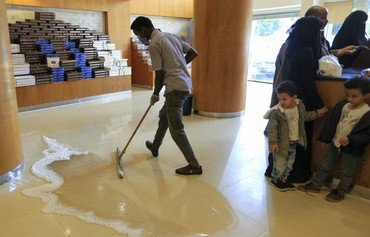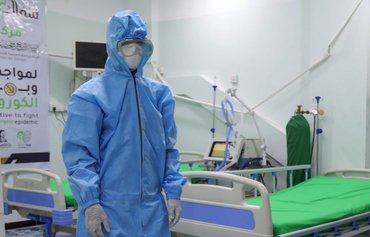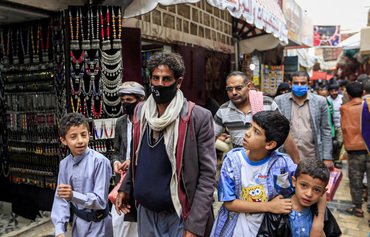Yemenis residing in areas controlled by the Iran-backed Houthis (Ansarallah) have been critical of the militia's recent decision to allow certain businesses to reopen, accusing it of prioritising profit over public health.
The Houthis on July 13th approved a programme that rolls back some of the precautionary measures put in place to stem the spread of novel coronavirus (COVID-19), even as the virus continues to claim lives across Yemen.
They ordered the reopening of wedding halls, restaurants, hamams, parks and sports stadiums, while continuing to mandate social distancing at these facilities.
While the Yemeni government has reported 1,681 coronavirus infections, as of July 27th, the number of cases in Houthi-controlled areas is not known, as the militia has imposed a media blackout on that information.
"Enforcing social distancing in wedding halls is difficult," Burhan Saleh, an official at a wedding hall in Sanaa, told Al-Mashareq.
Saleh said the decision to reopen these facilities appears to be motivated by the revenue from fines that can be levied against owners who do not fully comply with the reduced measures, rather than concern for public health.
Motivated by profit
Reopening halls and clubs "is strictly for financial gain", political analyst Adel al-Shujaa told Al-Mashareq, adding that "anytime the [Houthis] can profit from something, they are willing to sacrifice the entire Yemeni population".
He pointed out that "before the decision was issued, the militia had reopened summer camps and assembled children for ideological mobilisation".
"The Houthis are putting people at risk of death, thrusting them to the battlefronts and storing weapons near their homes, so they will not hesitate to open halls and clubs, which generate profit for them," al-Shujaa said.
The Houthis eased the restrictions on certain businesses after receiving large sums of money from the business owners during a recent meeting, the Khabar news agency reported.
"The meeting, which was attended by representatives of social events halls, clubs, restaurants and hamams, was behind their reopening and resumption of their activities," economist Abdul Aziz Thabet told Al-Mashareq.
It appears that the payment of tributes enabled them to resume their business activities, he said.
"If the decision to allow these establishments to resume their activities was based solely on criteria related to the coronavirus outbreak, it would have applied to all private and public sector establishments," he said.
The Houthis consider "only their interests, and the revenue they expect to derive from these establishments, such as the qat markets, without regard to the lives of citizens", Thabet said.
Lack of transparency
"The Houthis' decision does not take into account the concerns of the World Health Organisation, which warned of a second wave of infections," said Dr. Arafat Mohammed, who works at a private hospital in Sanaa.
"Hospitals and centres designated for treating people infected with the coronavirus in Sanaa are filled with patients," he told Al-Mashareq.
Most Sanaa residents do not speak openly about those suspected of being infected with the virus out of fear the Houthis will retaliate against them or their families, he said.
"Many of [those infected] prefer to stay in their homes and self-quarantine until they recover or die," Mohammed said.
He said he was surprised at the Houthis' decision to reopen certain public venues, describing it as "a strange decision".
"Even if the number of infections has gone down, then why do the Houthis not reveal the number of infections?" he wondered.

![Yemeni men share a meal at a restaurant in Sanaa on July 16th, following the easing of measures against coronavirus. [Mohammed Huwais/AFP]](/cnmi_am/images/2020/07/27/25105-Yemen-Sanaa-restaurant-600_384.jpg)






